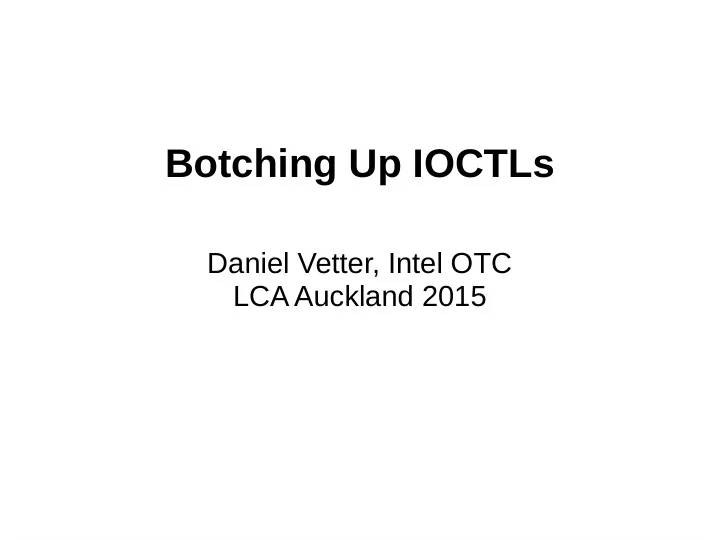

Botching Up IOCTLs Daniel Vetter, Intel OTC LCA Auckland 2015
overview ● basics: testcases, interface type, ... ● technicalities for proper ABI design ● special topics like resource handling, signals, time, ...
basics: interface type ● (generic) IOCTL or syscall? ● read/write/poll on an FD ● sysfs, configfs, debugfs, … ● extend existing subsystesm like perf
basics: real-world userspace ● tested, reviewed, ready for merging ● production code (corner cases, errors all handled) ● BUT: always merge kernel patches first
basics: testcases ● for everything ● FOR EVERYTHING ● focus on evil corner-cases
technicalities: struct ABI ● goal: no compat layer ● only use __s32 , __u32 , __s64 and __u64 ● if you have any 64 bit members: align/pad everything to 64 bit ● pointers are __u64 ● __attribute__((packed)) plus explicit padding when you screwed up
technicalities: input validation ● unchecked stack garbage breaks extendability ● unchecked evil input scores CVEs ● overflows (careful with variable-sized arrays) ● invalid combinations&values ● have testcases for everything
technicalities: flags ● have a flags parameter ● reject invalid flags with -EINVAL ● have a testcase ● specifically check for: invalid flag combinations, unused values in bitfields and the next available flag
technicalities: compatibility ● hide big things for 1-2 kernel releases ● flags, driver caps, userspace caps for opt-in, interface revisions ● remember: it's only a regression when you get a bug report
technicalities: endianess ● it's horrible ● but the world is mostly little-endian
resources ● attach everything to a struct file ● consider standard file types like dma-buf, fences, ... ● support O_CLOEXEC
resources: sharing ● private namespace ok when there's tons of objects ● but don't reinvent resource passing/sharing ● consider uniqueness requirements ● proper fstat() unfortunately needs a full virtual fs
resources: access & revoke ● consider revoke support for global&unshareable resources ● required for proper session switching ● priviledged operation ● properly isolate other objects (e.g. gpu buffers)
signals ● it's UNIX, no way to avoid them ● man (7) signal: „slow“ devices can return -EINTR, others restart by default ● „slow“ devices unclear disdinction and autorestart are fragile
signals: solutions ● userspace simply handles -EINTR correctly in all cases ● or don't support signals when blocking
signals: killable waits ● nice, but ● process exit doesn't necessarily close file ● E.g. logind has dup'ed FD for revoke ● hard to test -EINTR code in the kernel
signals: „Stop worrying and ...“ ● restarting makes testing error paths trivial ● the more interruptible waits you have the better ● duplicate all your functional tests with one where the main thread gets interrupted all the time ● inject -EINTR for testing
signals: summary ● support full restarting ● shared fooIoctl() in userspace to enforce proper restarting even for -EINTR ● exploit -EINTR for testing error paths ● or only do blocking on pollable FDs
time: sampling ● make the clocksource clear to userspace, different clocks will mismatch ● prefer CLOCK_MONOTONIC ● allow userspace to sample hw clocks ● __s64 seconds + __u64 nanoseconds for structs (to match ktime ), enforce normalization
time: waiting ● seriously consider pollable FDs ● support absolute timeouts ● convert relative to absolute for restarting
documentation ● prefer executable specs ● manpages for generic interfaces ● forget about Documentation/ABI ... maybe
summary ● real world user ● testcases, testcases, testcases ● don't screw up technicalities too badly, see http://blog.ffwll.ch/2013/11/botching-up-ioctls.html ● think about documentation
Recommend
More recommend